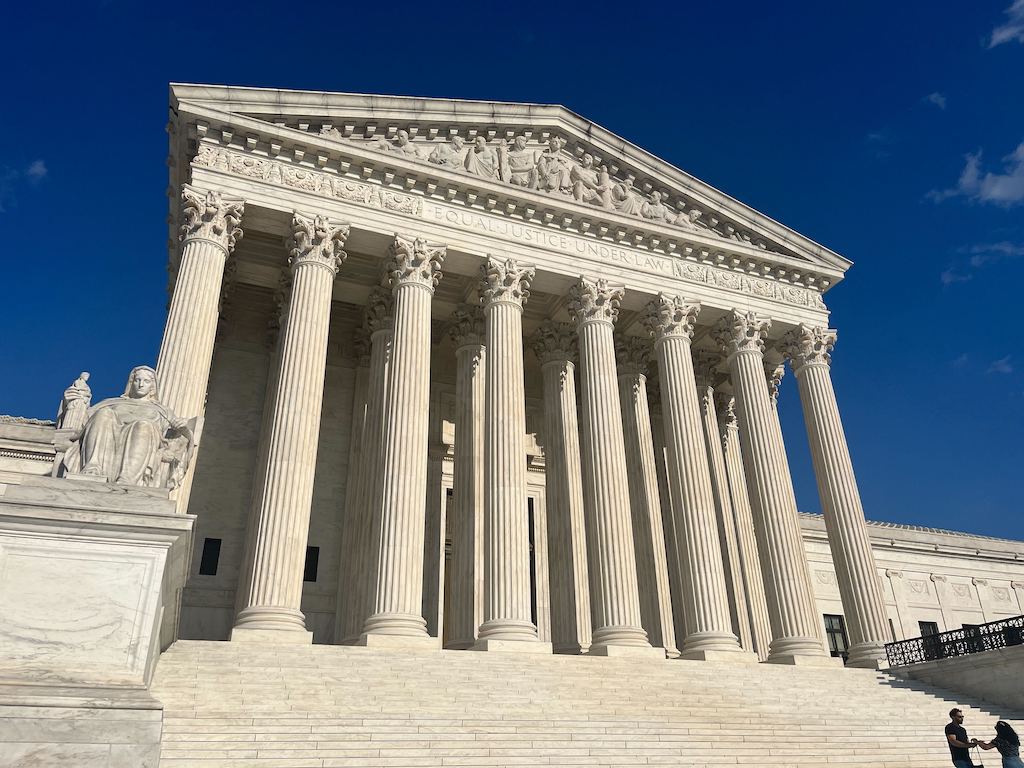WASHINGTON – The Supreme Court heard arguments Tuesday over Biden administration guidelines that put a priority on arresting noncitizens with criminal backgrounds or those who pose a threat to national security.
In September 2021, the Department of Homeland Security released immigration enforcement guidelines that prioritized the apprehension and removal of three classes of noncitizens, including those who pose a threat to national security, public safety, or border security.
Texas and Louisiana sued to stop the guidelines; the 5th Circuit Court decided in their favor and issued an order stopping the guidelines from being implemented nationwide.
The federal government is calling for a reversal of that decision, arguing that the district court only had authority to grant an injunction to the parties before it, therefore pausing the guidelines in Texas and Louisiana during the legal process, rather than removing the policy entirely.
The Biden administration argues that the states lack standing to sue; that the district court’s decision to vacate the guidelines was improper and that the new guidelines are consistent with a history of the government’s prosecutorial discretion.
States’ legal ability to sue the government based on the administration’s guidelines, especially immigration policies, is a central issue in the Supreme Court case.
The administration argued that states did not have standing to sue because they do not suffer direct harm from the policy. Texas and Louisiana said they faced indirect impacts like increased spending on law enforcement and social services.
“Getting into the facts of this case, there was no basis in this record to show that the states will incur these indirect effects on their own taxing, spending, or regulating,” said U.S. Solicitor General Elizabeth Progar.
Texas Solicitor General Judd Stone argued that states take on the danger of violent crime and costs of further incarceration if certain noncitizens are not detained by DHS immediately after release from their criminal sentences.
“Texas suffers injuries regardless of what it does, whether it detains, releases or paroles individuals because not only do we have law enforcement costs, but social service costs, and very serious threats of recidivism,” Stone said.
But Justice Elena Kagan didn’t seem persuaded.
“The fact that you are not the party directly regulated and the fact that you are challenging an enforcement action – particularly an enforcement action where the most discretion has been given to executive officials – those form the backdrop by which we should say ‘it is just not enough that you are coming in here with a set of speculative possibilities about your costs,’” she said.
Kagan also worried that this case would set a dangerous precedent of states dictating federal immigration policy.
“This isn’t anything that has to do with this (Biden) administration – some other administration will come in and the California solicitor general where you are,” said Kagan. “Immigration policy is supposed to be the zenith of federal power, and it’s supposed to be the zenith of executive power. Instead we’re creating a system where a combination of states and courts can bring immigration policy to a dead halt.”
Justice Ketanji Brown Jackson argued that the states made voluntary decisions to incarcerate noncitizens not considered threats by the federal government, making associated costs a self-inflicted injury.
Implementing the guidelines falls on the discretion of ICE officers, who are asked to assess noncitizens based on “the totality of the circumstances” to determine whether they pose a threat to public safety
The guidelines build upon two existing provisions that require certain noncitizens to be detained during removal proceedings. One provision says that the DHS “shall take into custody” non-citizens who have committed certain offenses, while the other says that DHS “shall remove” and “shall detain” noncitizens within 90 days of a filing of a removal order.
The justices spent time Tuesday discussing the meaning of “shall.”
Progar contended that “shall” cannot be interpreted literally. Expecting the DHS to apprehend, detain and remove all 11 million undocumented immigrants would be impossible given the agency’s current allocated resources, she said.
“It is impossible for DHS to comply with each and every ‘shall’ in the (Immigration and Nationality Act),” Progar said. “We don’t have the resources or ability to go after those individuals who are threats to public safety, national security and border security. That is a senseless way to run an immigration enforcement system and it’s not the statute Congress enacted.”
Chief Justice John Roberts pushed back.
“When we get to the merits, I think ‘shall’ means ‘shall,’” he said. “It’s our job to say what the law is, not whether or not it can be possibly implemented or whether there are difficulties there, and I don’t think we should change that responsibility because Congress and the executive can’t agree on something that is possible to address this problem.”

